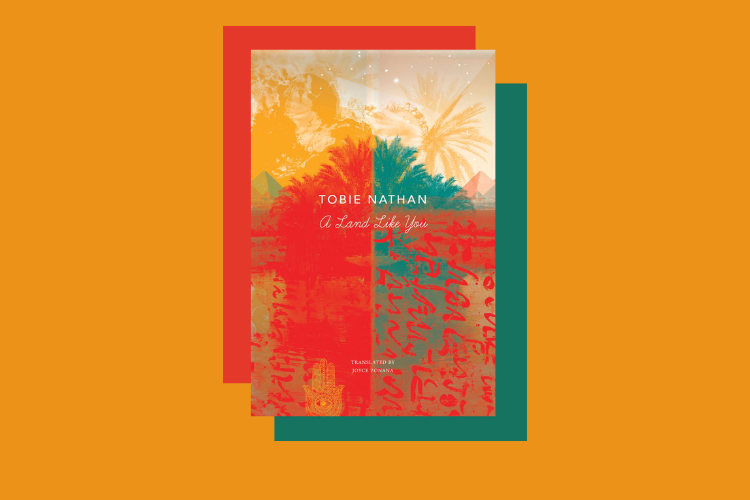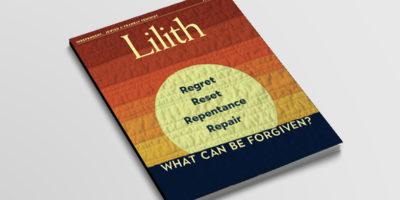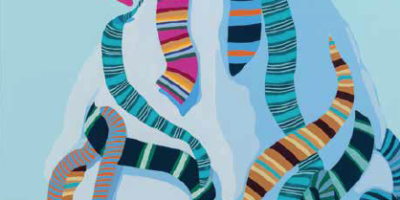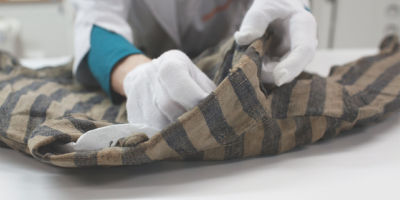
On Translating from the French “A Land Like You”
Even before I’d read a word, I was eager to translate Ce pays qui te ressemble—A Land Like You. (My translation has just been published, Seagull Books, $27.50.) The novel is by Egyptian-Jewish writer Tobie Nathan. My friend Elio Zarmati had told me that it was the best book he’d read about the “magic” of life in Cairo’s ancient Jewish quarter, Haret al-Yahud. “I mean magic in the literal sense,” Elio, also an Egyptian-Jewish writer, had explained, “talismans, curses, healing, sorcery…a blend of Jewish and Egyptian mysticism drawn in vivid words by a Sephardic Marc Chagall.” I wasted no time ordering the novel.
Translating from French to English is my second career, partly because French is my mother tongue, the language my parents spoke long after we’d immigrated to the U.S. in 1951. In Cairo, my father had worked as an interpreter between French and Arabic; in Brooklyn he sometimes brought home English to Arabic translation jobs. I grew up with tattered dictionaries outspread on the kitchen table, tantalized as relatives jabbered in a wild blend of French, Arabic, and Italian. Because my parents’ English was limited, I early on assumed the role of interpreter.
In turning to translation in my sixties, I had returned to my childhood passion; in choosing Nathan’s novel, I returned to a “world of our mothers”—the sensually alluring world of Arab Jews in the first half of the twentieth century.
In the novel’s opening paragraphs, the narrator—Zohar Zohar, “jewel of the jewels”—describes his mother rising before dawn to make ful mudammas, the bean stew I still savor: “With a fork, she mashed boiled favas while ladling on oil and adding little bits of hard-boiled egg. She brought her face close: the fragrance of a happy morning.” With Zohar, I could see and smell and taste that ful, “the substance from which Egyptians are made.”
From the start, I felt more at home in Tobie Nathan’s richly-imagined world than in any book I’d read in English or French, including other works by Egyptian Jews. For one thing, it was the language— “Not French French but Middle Eastern French just like the way we spoke,” as my cousin Victor put it— “the expressions, the idioms, the juxtapositions of certain words, the tone, the manner of speaking.” It was a world drenched in Egyptian sensibility, colored by the sights and sounds and smells and tastes of old Cairo.
Although the novel’s main character is Zohar, the story’s driving forces are women, beginning with Zohar’s mother, Esther. Thought to be possessed by a demon after a childhood fall, at 14 she marries her cousin Motty. Still childless at 21, Esther turns to an Arab midwife who leads her to a kudiya, a sorceress who initiates her into the trance-dance cult of the zars. And when she cannot nurse the child that finally comes to her, a Muslim singer suckles Zohar beside her own daughter Masreya, “the Egyptian woman.” As they mature, Zohar and Masreya find themselves bound by a transcendent, earth-shaking love.
Stir in the historical background—the British occupation of Egypt, the foibles of King Farouk, the incendiary rise of Arab and Jewish nationalism—and you have the magic potion that is this novel.
A renowned ethno-psychiatrist who has spent his career honoring the beliefs of non-Western peoples, Tobie Nathan brings to his writing an open-hearted, boundary-crossing, mystical Judaism, best embodied in Zohar’s father Motty, a blind accountant known for his beautiful voice, chanting Hebrew verses from the Song of Songs at every turn: “Thou hast ravished my heart, my sister, my spouse; thou hast ravished my heart with one of thine eyes.” Esther, Zohar’s mother, has her own eloquence: “We live beside the Arabs the way a man might live beside his innards,” she observes. “Our tales fill their Qur’an, their tongue fills our mouth. Why aren’t they us? Why aren’t we them?”
During my first visit back to Cairo, in 1999, when I was working on my own memoir, I stumbled upon the Rambam, a crumbling synagogue in Haret al-Yahud, where Moses Maimonides (“Rav Moshe”) had founded his medieval yeshiva. Unaware of the Rambam synagogue’s history as a place of healing, I found myself weeping uncontrollably; that night I dreamt I saw a rabbi’s face shining over me in a dome of stars. Later I learned that my mother, hoping to conceive a child, had spent a night in the Rambam nine months before I was born. In A Land Like You, Esther, already pregnant but anxious about consorting with “strange gods,” visits the Rambam and has a vision of Rav Moshe: “I carry the dance in my stomach,” he reassures her.
It was as if Tobie Nathan were reassuring me as I read and translated his work. For while the story he tells is not mine, the feelings he expresses are precisely my own. “Egypt is my mother, the womb of all my thoughts,” he writes, “the Nile is the artery that irrigates our bodies.” Which is why I was so thrilled to meet him earlier this year in Paris, at the home of another Egyptian-Jewish writer, Paula Jacques. We chatted in our Arabic-inflected French as if we’d known each other all our lives. In the most important sense, of course, we had. As Zohar says, “Although I left Egypt, Egypt never left me.”
Joyce Zonana is a writer and literary translator from French and Provençal to English. A regular contributor to the blog Feminism and Religion, she has published a memoir, Dream Homes: From Cairo to Katrina, an Exile’s Journey (Feminist Press 2008), and translated works by Henri Bosco, Jóusè d’Arbaud, and Tobie Nathan.




